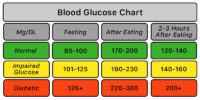Diabetes Management: Tips For Monitoring Blood Sugar Levels
Diabetes management plays a crucial role in maintaining overall health and preventing complications associated with the condition. Monitoring blood sugar levels is a key aspect of diabetes management, as it allows individuals to make informed decisions about their diet, medication, and lifestyle choices.
This article provides tips for effectively monitoring blood sugar levels to ensure optimal diabetes control. Understanding blood sugar levels is the first step towards effective monitoring. Differentiating between normal and abnormal levels helps individuals identify when their blood sugar is too high or too low.
Selecting the right glucometer is equally important, as it determines the accuracy of blood sugar readings. Establishing a monitoring routine ensures consistency and helps individuals track their progress over time. Tracking carbohydrate intake is crucial, as carbohydrates have a direct impact on blood sugar levels.
Recognizing symptoms of high and low blood sugar is essential for timely intervention. Adjusting medication dosages in consultation with a healthcare professional is important to maintain optimal blood sugar control. Additionally, incorporating regular exercise into one’s routine can help regulate blood sugar levels.
For comprehensive guidance, it is advisable to seek professional assistance from healthcare providers who specialize in diabetes management. By following these tips, individuals can effectively monitor their blood sugar levels and take proactive steps towards achieving optimal diabetes control.
Key Takeaways
- Choosing an accurate and user-friendly glucometer is crucial for effective diabetes management.
- Establishing a monitoring routine helps track progress and identify patterns in blood sugar levels.
- Tracking carbohydrate intake is essential as it directly impacts blood sugar levels.
- Seeking professional assistance from diabetes management specialists is advisable for personalized recommendations and support.
Understanding Blood Sugar Levels
Understanding blood sugar levels is essential for effective diabetes management.
Blood sugar, or blood glucose, refers to the amount of sugar present in the bloodstream. It serves as a crucial energy source for the body’s cells and organs.
For individuals with diabetes, their blood sugar levels can become imbalanced, leading to potentially serious complications if left unmanaged.
Monitoring blood sugar levels allows individuals to make informed decisions about their diet, medication, and overall lifestyle choices.
The target blood sugar range for most people with diabetes is typically between 80 and 130 milligrams per deciliter (mg/dL) before meals and less than 180 mg/dL two hours after starting a meal.
Regular monitoring of blood sugar levels enables individuals to identify patterns, detect potential issues, and make necessary adjustments to maintain optimal control over their diabetes.
Choosing the Right Glucometer
Selecting the appropriate glucometer is crucial for accurate and reliable measurement of glucose concentrations in the blood. When choosing a glucometer, there are several factors to consider:
-
Accuracy: It is important to select a glucometer that provides accurate readings. Look for a device that has been validated by regulatory authorities and has a low margin of error.
-
Ease of use: Opt for a glucometer that is user-friendly and requires minimal steps for testing. Features like a large display, backlight, and easy-to-navigate menus can make monitoring blood sugar levels more convenient.
-
Cost: Consider the cost of the glucometer and the associated test strips. Some glucometers may be inexpensive, but the cost of test strips can add up over time. Compare prices and choose a device that fits within your budget.
By considering these factors, individuals with diabetes can select a glucometer that suits their needs and helps them effectively monitor their blood sugar levels.
Establishing a Monitoring Routine
Creating a consistent and structured monitoring routine is essential for effectively managing and maintaining optimal glycemic control. By establishing a routine, individuals with diabetes can track their blood sugar levels regularly, identify patterns, and make necessary adjustments to their diet, medication, and lifestyle. This helps to prevent complications and maintain overall health. A monitoring routine should include regular testing at specific times throughout the day, such as before and after meals, before exercise, and before bed. It is important to record the results in a logbook or a digital app to track trends over time. Additionally, it is recommended to consult healthcare professionals to determine the target blood sugar levels and to make any necessary adjustments to the routine.
| Benefits of Establishing a Monitoring Routine | Emotional Response | ||
|---|---|---|---|
| Improved glycemic control | Confidence | ||
| Prevention of complications | Peace of mind | ||
| Better understanding of individual response | Empowerment | ||
| Ability to make informed decisions | Control | ||
| Increased confidence in diabetes management | Reassurance | Improved quality of life and overall well-being. |
Tracking Carbohydrate Intake
Tracking carbohydrate intake is a crucial aspect of diabetes self-care as it allows individuals to monitor their dietary choices and make informed decisions about their meal planning. Carbohydrates have a direct impact on blood sugar levels, and monitoring the amount consumed can help maintain stable glucose levels.
By tracking carbohydrate intake, individuals can identify patterns and adjust their diet accordingly to achieve better blood sugar control. This can be done by reading nutrition labels, measuring portion sizes, and keeping a food diary.
Additionally, tracking carbohydrate intake can help individuals understand how different types of carbohydrates affect their blood sugar levels. This knowledge can guide them in choosing healthier options and managing their diabetes effectively.
Overall, monitoring carbohydrate intake is an essential tool in diabetes management and empowers individuals to take control of their health.
Recognizing Symptoms of High and Low Blood Sugar
Recognizing the symptoms associated with imbalances in blood sugar can be a valuable skill for individuals seeking to maintain stable glucose levels. By understanding and identifying the signs of high or low blood sugar, individuals with diabetes can take prompt action to prevent complications and maintain optimal health.
Here are three important symptoms to watch out for:
-
Hypoglycemia: Symptoms of low blood sugar include shakiness, dizziness, confusion, irritability, sweating, and hunger. Promptly consuming a source of carbohydrates can help raise blood sugar levels.
-
Hyperglycemia: High blood sugar symptoms may manifest as increased thirst, frequent urination, fatigue, blurred vision, dry mouth, and fruity breath odor. It is crucial to take appropriate insulin or medication, monitor carbohydrate intake, and consult a healthcare professional if symptoms persist.
-
Diabetic ketoacidosis (DKA): This severe condition can occur when blood sugar levels rise too high. Symptoms include excessive thirst, frequent urination, nausea, vomiting, abdominal pain, difficulty breathing, and confusion. Immediate medical attention is necessary in such cases.
By recognizing these symptoms, individuals can proactively manage their blood sugar levels, thereby reducing the risks associated with diabetes.
Adjusting Medication Dosages
Adjusting medication dosages is an essential aspect of managing glucose control in individuals with diabetes. It involves making necessary changes to the prescribed medication doses to maintain optimal blood sugar levels. This process requires regular monitoring of blood sugar levels and collaborating with healthcare professionals to determine the appropriate adjustments. The goal is to find the right balance between controlling blood sugar levels and minimizing the risk of side effects from medication.
To help visualize the importance of medication dosage adjustments, a table is provided below:
| Medication Dosage Adjustment | Benefits |
|---|---|
| Correcting high blood sugar levels | Prevents hyperglycemia-related complications such as increased thirst, frequent urination, and fatigue |
| Adjusting for low blood sugar levels | Prevents hypoglycemia-related symptoms such as dizziness, confusion, and seizures |
| Tailoring medication doses to individual needs | Optimizes glucose control and minimizes the risk of adverse effects |
| Adapting to lifestyle changes | Accommodates changes in diet, exercise, stress levels, and illness |
| Monitoring for medication effectiveness | Ensures that the prescribed medication is adequately managing blood sugar levels |
Adjusting medication dosages is crucial for effective glucose control in individuals with diabetes. Regular monitoring and collaboration with healthcare professionals are essential to find the right balance and optimize diabetes management.
Exercise and Blood Sugar Control
Exercise plays a crucial role in managing blood sugar levels for individuals with diabetes. It can help improve insulin sensitivity, lower blood glucose levels, and reduce the risk of complications associated with diabetes. Engaging in regular physical activity can also contribute to weight management, which is essential for diabetes control.
When it comes to exercise, individuals with diabetes should consider the following:
-
Consult with a healthcare professional before starting any exercise program.
-
Choose activities that are enjoyable and can be incorporated into daily routines.
-
Monitor blood sugar levels before, during, and after exercise to identify any fluctuations.
-
Be prepared by carrying a source of fast-acting carbohydrates in case of low blood sugar.
By following these guidelines, individuals with diabetes can effectively incorporate exercise into their routine and achieve better blood sugar control.
Seeking Professional Guidance
Seeking professional guidance is crucial for individuals with diabetes to ensure they receive expert advice and support in effectively managing their condition. Healthcare professionals, such as doctors, nurses, and dietitians, have the knowledge and expertise to provide personalized recommendations based on an individual’s specific needs and circumstances. They can help individuals understand the importance of monitoring blood sugar levels regularly and guide them on appropriate lifestyle modifications, medication management, and meal planning. Additionally, professionals can address any concerns or questions that individuals may have, offer emotional support, and assist in setting realistic goals for blood sugar control. Regular check-ups with healthcare professionals allow for ongoing assessment of diabetes management strategies and adjustments as needed. Seeking professional guidance is an integral part of diabetes management and can greatly contribute to better health outcomes.
| Advantages of Seeking Professional Guidance | Disadvantages of Not Seeking Professional Guidance | Tips for Finding the Right Healthcare Professional |
|---|---|---|
| Personalized recommendations | Lack of expert advice and support | Research local healthcare providers |
| Proper understanding of blood sugar control | Increased risk of complications | Seek recommendations from friends or family |
| Assistance with lifestyle modifications | Lack of emotional support | Check credentials and experience |
| Ongoing assessment and adjustments | Limited access to up-to-date information | Consider compatibility and communication style |
Frequently Asked Questions
Can stress affect blood sugar levels?
Yes, stress can affect blood sugar levels. When under stress, the body releases stress hormones that can cause the liver to produce more glucose, leading to increased blood sugar levels in individuals with diabetes.
Is there a specific time of day when it is best to check blood sugar levels?
There is no specific time of day that is universally considered the best for checking blood sugar levels. However, it is recommended to check levels consistently at the same time each day to establish a routine and identify patterns.
Can certain medications or supplements affect blood sugar levels?
Certain medications and supplements can affect blood sugar levels. It is important for individuals with diabetes to be aware of these potential effects and to consult with their healthcare provider to ensure optimal management of their condition.
How often should I check my blood sugar levels?
Blood sugar levels should be checked regularly to effectively manage diabetes. The frequency of testing may vary depending on factors such as the type of diabetes, treatment plan, and individual circumstances. Consult with a healthcare professional for personalized recommendations.
Are there any natural remedies or alternative treatments that can help manage blood sugar levels?
There are natural remedies and alternative treatments that may help manage blood sugar levels, such as incorporating regular exercise, following a balanced diet, consuming certain herbs and supplements, and managing stress levels.







